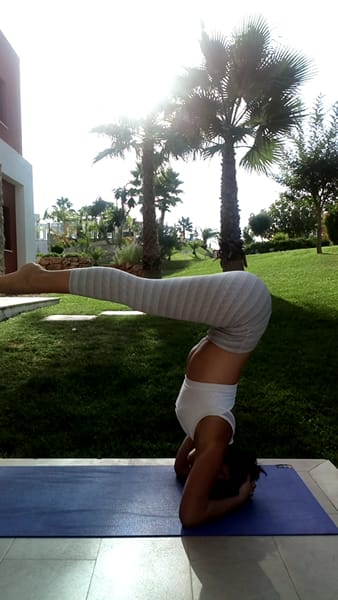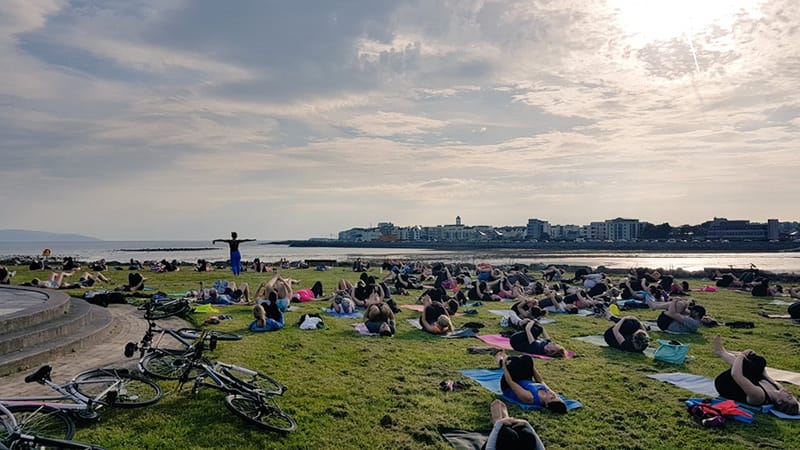The concept of “being aware” was not something that ever existed in my life. I was not aware of my thoughts, my emotions, and certainly not my breathing – that is, until one day I couldn`t breathe. I just existed. I cared so much about what other people thought that I didn’t have room to care for myself.
Growing up, I liked to keep everything nice and happy, always avoiding arguments and confrontations. The result? Years of suppressed emotions and tension. I avoided any awkward emotions or thoughts that might demand attention in my mind. I drank them away, I smoked them away, I danced them away, I smiled them away. Except they didn’t go away. All those ignored emotions and thoughts came back to bite me in the bum one day – and then, it was system overload.
‘A Guide to Life’ instruction, or even ‘Life Lessons’, would have been helpful at school. I had heard of mental health problems and depression, but I thought they were a whole separate issue to anything I had been feeling. I assumed those terms referred to a segment of people in society who were ‘crazy’ and had breakdowns, and could never be saved. Nothing like that could ever happen to me – I believed I was so happy, and I thought I was invincible.
It seems obvious now, but at the time I wasn`t aware that if you abuse your body and your mind for long enough (by not eating or drinking well, not resting enough, not giving your mind or your body space), then something is going to crack.
I had my first panic attack in New Zealand, during what was supposed to be the backpacking adventure of a lifetime. My whole body was exhausted from travelling, and I was living on coffee, cigarettes and very little sleep. I went to hospital thinking I was having a heart attack – I was the most scared I had ever been. I thought I was going to die; my heart was going so fast it was all I could hear, and the only thing I could see were the concerned faces of the nurses. All I could think was: “My poor mother – they’ll have to ring her to tell her I’ve passed away.” Little did I know then that I was going to feel like this – the most scared I had ever been – over and over and over again.
When the doctors told me I had had a panic attack, I was so confused. I didn’t really know what it was – I thought it was just something people said when they were about to do their driving test. I didn’t think it could be such a terrifying experience. My heart had been going three times as fast as it should, and my whole body was shaking uncontrollably. This would happen hundreds more times over the following two years.
What began that day in New Zealand developed into panic disorder and agoraphobia – and so began my journey and deep dive into learning about our bodies, our minds and our need for self-care, all in order for me to begin healing.
During one of my panic attacks, I remember walking the prom in Salthill in Galway. The whole place started spinning, and it felt like everyone was staring at me. I couldn’t breathe, I couldn’t see or hear. I remember thinking I was losing my mind. My next thought was: “Surely if I’m losing my mind, I wouldn’t be aware of it, would I?”
That moment brought me to the realisation that my mind was not me. There was a ‘Me’ sitting down there somewhere. A very feeble, quiet ‘Me’, maybe – but it was there. I was able to distinguish that ‘Me’ from my mind – and from that moment onwards I began a very long, hard journey of deep self-inquiry, and ultimately healing.
I instinctively chose not to take any medication, because I felt it would put a very large cushion over everything that obviously needed to be released. I had put enough cushions on top of things to mute them over the years, and my gut instinct was that medication was not for me, though I know it has helped so many people.

This might sound like a lovely retreat, but at the time it was far from it. It was horrible, every extremely long second of it. There was constant noise in my head, and I was scared to socialise or go to the shops. The traffic frightened me. People talking to me frightened me. I was uncomfortable and scared every minute of the day.
Slowly, slowly, I became healthier and stronger. The physical pains lessened, and my mind began to grow quieter. It was a long, hard, lonely road. Nobody really knew what was wrong with me, and therefore often people didn’t have much patience or compassion.
I often wished I had broken my leg, or suffered something physical that was visible to others. Perhaps I would even have gotten a Get Well Soon card. For me, any kind of mental health issue should be seen the same as a physical illness. Even if we are unsure of what is going on with someone, it is important to find out, ask questions and act from a place of love and compassion.
After a period of time hating yoga, I fell deeply in love with it. I loved it so much that I trained to be a yoga teacher. After a few years training I am now a full-time yoga teacher and I lead yoga retreats and events in Galway, throughout Ireland and internationally. That feeble ‘Me’ that used to sit quietly inside is now content, happy, and living as fearlessly as she can. Little did I know the ‘Me’ that had a panic attack on the prom in Salthill would a few years later be leading a yoga class full to the brim with people in the very same spot, in the beautiful open fresh Atlantic air. Change is always possible.
For more information on Sinéad’s yoga classes, workshops and retreats check out loveyoga.eu

Support Our Campaign
We rely on the generosity of the public to fund our work and so far together we have achieved great things! Please do continue to support us so we can provide future generations in Ireland with the resources to recognise and talk about their emotions, and equip them to navigate the ever-changing world around them as they grow




























